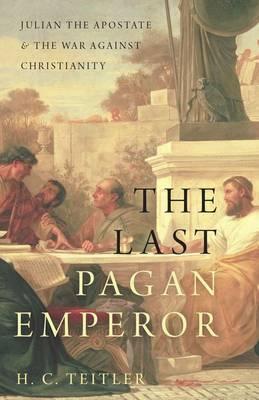Last Pagan Emperor

Last Pagan Emperor
his cousin Constantius II, one of Constantine's sons, who permitted him to study rhetoric and philosophy and even made him co-emperor in 355. But the relations between Julian and Constantius were strained from the beginning, and it was only Constantius' sudden death in 361 which prevented an impending
civil war.
As sole emperor, Julian restored the worship of the traditional gods. He opened pagan temples again, reintroduced animal sacrifices, and propagated paganism through both the spoken and the written word. In his treatise Against the Galilaeans he sharply criticised the religion of the followers of Jesus whom he disparagingly called 'Galilaeans'. He put his words into action, and issued laws which were displeasing to Christians-the most notorious being his School Edict. This provoked the
anger of the Christians, who reacted fiercely, and accused Julian of being a persecutor like his predecessors Nero, Decius, and Diocletian. Violent conflicts between pagans and Christians made themselves felt all over the empire. It is disputed whether or not Julian himself was behind such outbursts.
Accusations against the Apostate continued to be uttered even after the emperor's early death. In this book, the feasibility of such charges is examined.
PRP: 359.90 Lei
Acesta este Prețul Recomandat de Producător. Prețul de vânzare al produsului este afișat mai jos.
323.91Lei
323.91Lei
359.90 LeiLivrare in 2-4 saptamani
Descrierea produsului
his cousin Constantius II, one of Constantine's sons, who permitted him to study rhetoric and philosophy and even made him co-emperor in 355. But the relations between Julian and Constantius were strained from the beginning, and it was only Constantius' sudden death in 361 which prevented an impending
civil war.
As sole emperor, Julian restored the worship of the traditional gods. He opened pagan temples again, reintroduced animal sacrifices, and propagated paganism through both the spoken and the written word. In his treatise Against the Galilaeans he sharply criticised the religion of the followers of Jesus whom he disparagingly called 'Galilaeans'. He put his words into action, and issued laws which were displeasing to Christians-the most notorious being his School Edict. This provoked the
anger of the Christians, who reacted fiercely, and accused Julian of being a persecutor like his predecessors Nero, Decius, and Diocletian. Violent conflicts between pagans and Christians made themselves felt all over the empire. It is disputed whether or not Julian himself was behind such outbursts.
Accusations against the Apostate continued to be uttered even after the emperor's early death. In this book, the feasibility of such charges is examined.
Detaliile produsului









